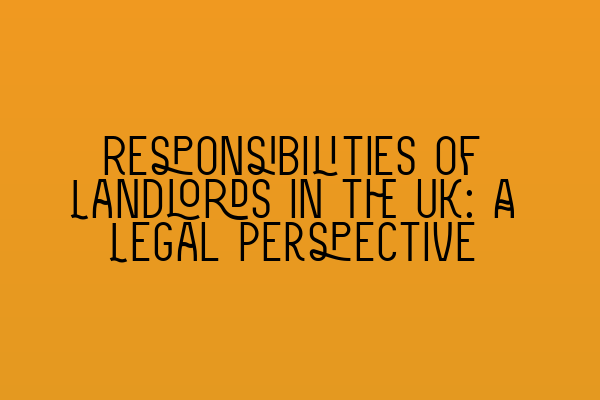Responsibilities of Landlords in the UK: A Legal Perspective
Being a landlord in the United Kingdom comes with numerous responsibilities. It’s important to understand these obligations to ensure compliance with the law and provide a safe and habitable environment for your tenants. In this article, we will discuss the legal perspective on the responsibilities of landlords in the UK.
Tenant Safety and Well-being
One of the primary duties of a landlord is to provide a safe and secure living space for their tenants. This includes ensuring that the property meets all necessary health and safety regulations. These regulations cover a wide range of aspects, including fire safety, gas and electrical safety, and general upkeep of the property.
Fire safety is of utmost importance in rental properties. Landlords must ensure that appropriate fire safety measures, such as smoke alarms and fire extinguishers, are installed and regularly maintained. It’s also vital to have an escape route clearly marked in case of an emergency.
In terms of gas and electrical safety, landlords must obtain valid Gas Safety and Electrical Installation Condition Reports from certified professionals. These reports should be obtained annually to ensure the property’s compliance with safety standards.
Additionally, landlords are responsible for maintaining the property in a good state of repair. This includes addressing any structural issues, resolving damp or mold problems, and ensuring the plumbing and heating systems are in working order. Regular inspections and prompt repairs are necessary to maintain a habitable living environment for tenants.
If you’re a landlord looking for guidance on SQE 1 preparation or practice exams, check out this SQE 1 Practice Exam Questions article.
Tenant Deposit Protection
Any deposit taken from a tenant must be protected in a government-approved tenancy deposit scheme. Landlords have a legal responsibility to protect their tenants’ deposits within 30 days of receiving them. Failure to do so can result in severe penalties, including being unable to evict a tenant through the Section 21 procedure.
Tenancy deposit protection schemes offer an independent resolution service for deposit disputes between landlords and tenants. It ensures that the deposit is safely held and returned in accordance with the tenancy agreement and relevant legislation.
If you require assistance with SQE 1 practice mocks or quizzes, consider checking out this SQE 1 Practice Mocks FLK1 FLK2.
Tenant Communication and Documentation
Effective communication between landlords and tenants is essential for maintaining a healthy landlord-tenant relationship. Landlords should communicate clearly and promptly with tenants regarding any changes, repairs, or other issues related to the property.
It is crucial to provide tenants with legally required documentation, including the tenancy agreement and an Energy Performance Certificate (EPC). The tenancy agreement should clearly outline the rights and responsibilities of both the landlord and the tenant. An EPC is required to give tenants information about the energy efficiency of the property.
Landlords should also keep a record of any repairs, inspections, or other correspondence related to the tenancy. These records can be crucial in case of any disputes or legal issues that may arise in the future.
For those seeking SQE 2 preparation courses, helpful resources can be found in this SQE 2 Preparation Courses article.
Tenant Privacy and Right of Entry
Tenants have a right to quiet enjoyment and privacy in their rental property. Landlords must respect this right and provide appropriate notice before entering the property for inspections or repairs.
Under UK law, landlords must provide tenants with at least 24 hours’ notice before entering the property, except in cases of emergency. Failure to provide adequate notice can infringe upon a tenant’s rights and may lead to legal consequences.
If you need information regarding SRA SQE exam dates, visit this SRA SQE Exam Dates page.
Conclusion
As a landlord in the UK, it is essential to understand and fulfil your legal responsibilities. Providing a safe and habitable living environment, protecting tenant deposits, maintaining open communication, and respecting tenant privacy are all key aspects of being a responsible landlord.
To ensure your compliance with the law and stay updated on best practices, consider seeking guidance from legal professionals or undertaking SQE 1 or SQE 2 preparation courses.
